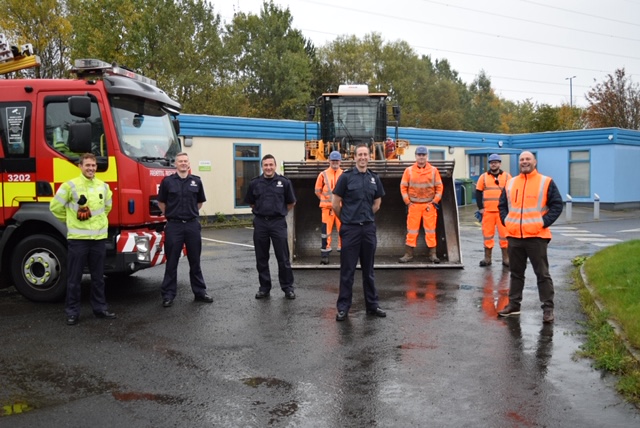news
TWFRS and SUEZ join national fight against “zombie batteries” to tackle recycling and waste fires
SUEZ Recycling and Recovery UK (SUEZ) and Tyne and Wear Fire and Rescue Service are urging everyone to join in the fight against Zombie batteries in a bid to tackle the growing number of fires caused by carelessly discarded dead batteries.
Both organisations are supporting the new national Take Charge campaign which urges consumers to only recycle dead batteries using specialist battery recycling services, and to never throw batteries away alongside general rubbish or other recycling.
Dead batteries thrown away with other waste and recycling, which the campaign refers to as “zombie batteries”, are likely to be crushed or punctured once the waste is collected and processed. Some battery types in particular, like lithium-ion (Li-ion) and nickel-metal Hydride (NiMH), can ignite or even explode when they’re damaged. Once this happens, the batteries can quickly set fire to other materials within the waste, like paper, leading to serious incidents that put lives at risk.

These batteries are often found in products like laptops, tablets, mobile phones, radio-controlled toys, Bluetooth devices, shavers, electric toothbrushes, power tools, scooters and even e-cigarettes. Although safe to use normally, powerful lithium-ion batteries are typically the most dangerous if they are not recycled properly.
The recycling and waste management trade body, the Environmental Services Association (ESA), which launched the campaign, conducts an annual survey of its members to record the proportion of fires occurring at recycling and waste facilities that are known or thought to have been started by lithium-ion batteries in particular.
Recent data collected by the ESA shows that, between April 2019 and March 2020, lithium-ion batteries alone were thought to be responsible for more than 250 fires at its members’ facilities during the year – or well over a third (38%) of all fires.
TWFRS crews recently attended a fire at SUEZ’s waste transfer station in Wallsend. Both teams swung into action and quickly brought the fire under control with limited damage to the facility. It is likely that the fire was caused by somebody putting batteries or a battery-operated device in the general waste container at the local household waste recycling centre (HWRC) rather than placing it in the correct recycling bin.
SUEZ, Tyne and Wear Fire and Rescue Service and ESA hope that by encouraging the public to recycle batteries responsibly, it will reduce the number of “zombie batteries” present in general waste and recycling, thereby reducing the number of fires in future.
Paul King, Senior Site Manager, SUEZ, said: “Unfortunately many people don’t realise how important it is to dispose of batteries and battery-operated appliances properly. We urge consumers to please recycle batteries responsibly by using widely available local battery recycling services in major supermarkets and at HWRCs.”
Graeme Macdonald, Wallsend Watch Manager, Tyne and Wear Fire and Rescue said: “The
crews who attended worked hard to bring the fire under control. Within minutes of attending crews had two jets applying water to tackle the fire, and protect the structure within it from the fire.
“Alongside employees of SUEZ, firefighters worked for the duration of the incident to separate the fuel from the fire, and ultimately extinguish what was a deep-seated fire.
“It is vital at incidents such as this to apply copious amounts of water if Lithium-ion batteries are suspected to be involved. However, not only do they react violently when involved in fire, the runoff from the water applied to extinguish the fire becomes contaminated and is hazardous to nature and the environment. We worked with SUEZ and the Environment Agency to ensure all run off was stored in underground tanks on site so to prevent any further damage to the local environment.
“It is vital batteries like Lithium-ion and Nickel-metal Hydride are disposed of responsibly at your local waste recycling centres to help prevent incidents of this nature occurring.”
Cllr Carl Johnson, cabinet member for Transport and the Environment, said: “We’d urge all
residents to take care when disposing of batteries as no one wants to cause an unnecessary fire. We have recently been emphasising the importance of not placing any batteries in household bins or caddies.
“Advice on recycling batteries is included within our ‘A to Z’ guide to recycling on our website at northtyneside.gov.uk.”
Consumers can find out more about the dangers of Zombie Batteries, by visiting the campaign
website at www.takecharge.org.uk.








